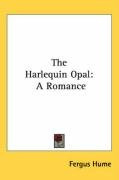Hume Fergus
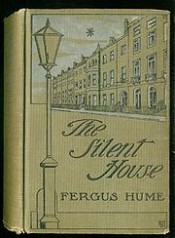
Fergusson Wright Hume, known as Fergus Hume (8 July 1859 – 12 July 1932) was an English novelist. Hume was born in England, the second son of Dr James Hume. At the age of three his father emigrated with his family to Dunedin, New Zealand. He attended Otago Boys' High School and studied law at the University of Otago. He was admitted to the New Zealand bar in 1885. Shortly after graduation he left for Melbourne, Australia where he obtained a post as a barristers' clerk. He began writing plays, but found it impossible to persuade the managers of the Melbourne theatres to accept or even read them. Finding that the novels of Émile Gaboriau were then very popular in Melbourne, he obtained and read a set of them and determined to write a novel of a similar kind. The result was the self-published novel The Mystery of a Hansom Cab (1886), which became a great success. He based his descriptions of low life on his knowledge of Little Bourke Street. He sold the English and American rights to the novel for fifty pounds, and thus derived little benefit from its success. It eventually became the top selling mystery novel of the Victorian era, John Sutherland calling it the "most sensationally popular crime and detective novel of the century.".[1] This novel inspired Arthur Conan Doyle to write "A Study In Scarlet", which introduced the world to Sherlock Holmes. As Doyle remarked, "Hansom Cab was a slight tale, mostly sold by "puffing". After the success of his first novel and the publication of another, Professor Brankel's Secret (c.1886), Hume returned to England in 1888. He resided in London for few years and then he moved to the Essex countryside where he lived in Thundersley for thirty years, eventually producing over 100 novels and short stories. He continued to be anxious for success as a dramatist, and at one time Henry Irving was favourably considering one of his plays, but he died before it could be produced. Hume did not court publicity and little is known of his personal life. The writer of the obituary notice in The Times stated that he was a deeply religious man who in his last years did much lecturing to young people's clubs and debating societies. He died at Thundersley, Essex, on 12 July 1932. Hume was a capable writer of mystery stories, and may be looked upon as one of the precursors of the many writers of detective stories whose work was so popular in the twentieth century. Notes References
do you like this author?
What readers are saying
What do you think? Write your own comment on this book!
write a commentWhat readers are saying
What do you think? Write your own comment on this author!
write a commentBook list

the solitary farm
Series:
Unknown
Year:
Unknown
Raiting:
3/5
Originally published in 1909. This volume from the Cornell University Library's print collections was scanned on an APT BookScan and converted to JPG 2000 format by Kirtas Technologies. All titles scanned cover to cover and pages may include marks notations and other marginalia present in the original volume.
Show more
add to favoritesadd In favorites
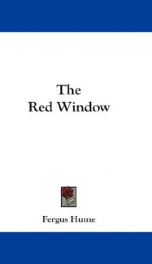
the red window
Series:
Unknown
Year:
Unknown
Raiting:
4/5
This scarce antiquarian book is included in our special Legacy Reprint Series. In the interest of creating a more extensive selection of rare historical book reprints, we have chosen to reproduce this title even though it may possibly have occasional imperfections such as missing and blurred pages, missing text, poor pictures, markings, dark backgrounds and other reproduction issues beyond our control. Because this work is culturally important, we have made it available as a part of our commitment to protecting, preserving and promoting the world's literature. --This text refers to the Paperback edition.
Show more
add to favoritesadd In favorites
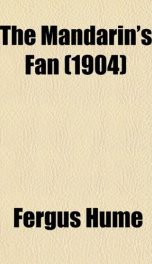
the mandarins fan
Series:
Unknown
Year:
Unknown
Raiting:
3/5
Purchase of this book includes free trial access to www.million-books.com where you can read more than a million books for free. This is an OCR edition with typos. Excerpt from book: CHAPTER III. MISS WHARF AT HOME. The best houses in Marport were situated on the cliffs. They stood a considerable way back and had small plots of ground before them, cultivated or not according to the taste of those who owned them. Some of these gardens were brilliant with flowers, others had nothing but shrubs in them, presenting rather a sombre appearance, and a few were bare sunburnt grass-plots, with no adornment whatsoever. A broad road divided the gardens from the grassy undulations of the cliffs, and along this thoroughfare rolled carriages, bicycles, and metor-cars all day during the season. Then came the grass on the cliff tops which stretched for a long distance, and which was dotted with shelters for nervous invalids. At one end there was a round bandstand where red-coated musicians played lively airs from the latest musical comedy. Round the stand were rows of chairs hired out at twopence an afternoon, and indeed all over the lawns seats of various kinds were scattered. At the end of the grass the cliffs sloped gradually and were intersected with winding paths which led downward to the asphalt Esplanade, which ran along the water's edge when the tide was high, and beside evil-smelling mud when the tide was out. And on what was known as the beach a somewhat gritty strandwere many bathing machines. Such was the general appearance of Marport, which the Essex people looked on as a kind of Brighton, only much better. Miss Sophia Wharf owned a cosy little house at the far end of the cliffs, and just at the point where Marport begins to melt into the country. It was a modern house, comfortably furnished and brilliant with electric lights. The garden in front of it was well taken care of, there were scarlet and white shades to the windows, and flower boxes filled w...
Show more
add to favoritesadd In favorites

the indian administration of lord canning reprinted from the bengal hurkaru
Series:
Unknown
Year:
Unknown
Raiting:
5/5
Show more
add to favoritesadd In favorites
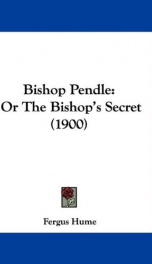
bishop pendle or the bishops secret
Series:
Unknown
Year:
Unknown
Raiting:
4.5/5
Purchase of this book includes free trial access to www.million-books.com where you can read more than a million books for free. This is an OCR edition with typos. Excerpt from book: CHAPTER III THE UNFORESEEN HAPPENS 'I Fear,' said Cargrim, with a gentle sigh, 'I fear you are right about that public-house, Mrs Pansey.' The chaplain made this remark to renew the discussion, and if possible bring Gabriel into verbal conflict with the lady. He had a great idea of managing people by getting them under his thumb, and so far quite deserved Mrs Pansey's epithet of a Jesuit. Of lateâas Cargrim knew by a steady use of his pale blue eyesâthe curate had been visiting The Derby Winner, ostensibly on parochial business connected with the ill-healih of Mrs Mosk, the landlord's wife. But there was a handsome daughter of the invalid who acted as barmaid, and Gabriel was a young and inflammable man; so, putting this and that together, the chaplain thought he discovered the germs of a scandal. Hence his interest in Mrs Pansey's proposed reforms. 'Right!' echoed the archidiaconal widow, loudly, 'of course I am right. The Derby Winner is a nest of hawks. William Mosk would have disgraced heathen Rome in its worst days ; as for his daughterâwell I Mrs Pansey threw a world of horror into the ejaculation. ' Miss Mosk is a well-conducted young lady,' said Gabriel, growing red and injudicious. 'Lady!' bellowed Mrs Pansey, shaking her fan; 'and since when have brazen, painted barmaids become ladies, Mr Pendle ?' ' She is most attentive to her sick mother,' protested the curate, wincing. ' No doubt, sir. I presume even Jezebel had some redeeming qualities. Rubbish ! humbug ! don't tell me ! Can good come out of Nazareth ?' ' Good did come out of Nazareth, Mrs Pansey.' ' That is enough, Mr Pendle ; do not pollute young ears with blasphemy. And you the son of a bishopâthe curate of a parish! Remember what is to be the portion of mockers, sir. What happened t... --This text refers to an alternate Paperback edition.
Show more
add to favoritesadd In favorites
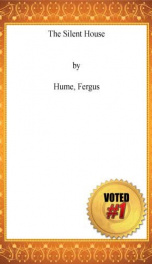
The Silent House
Series:
Unknown
Year:
Unknown
Raiting:
2/5
“The exception to the notable spotlessness of the neighborhood was No.13, a house in the centre of the side opposite to the entrance. Its windows were dusty, and without blinds or curtains, there were no flower-boxes on the ledges, the steps lacked whitewash, and the iron railings looked rusty for want of paint. Stray straws and scraps of paper found their way down the area, where the cracked pavement was damp with green slime. Such beggars as occasionally wandered into the square, to the scandal of its inhabitants, camped on the doorstep; and the very door itself presented a battered, dissolute appearance…”
A real page-turner from Fergusson Wright Hume, an English novelist of the nineteenth and early twentieth centuries. “The Silent House” was published in 1899, and tells a story of a mysterious murder in a not less mysterious house, which is said to be haunted. This is one of those books that will keep the reader guessing till the very last page.
Show more
add to favoritesadd In favorites
A real page-turner from Fergusson Wright Hume, an English novelist of the nineteenth and early twentieth centuries. “The Silent House” was published in 1899, and tells a story of a mysterious murder in a not less mysterious house, which is said to be haunted. This is one of those books that will keep the reader guessing till the very last page.
Show more
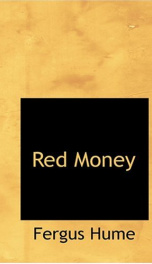
Red Money
Series:
Unknown
Year:
Unknown
Raiting:
2.5/5
As Mrs. Belgrove spoke she peered through her lorgnette to see if anyone at the breakfast-table was smiling. The scrutiny was necessary since she was the oldest person present and there did not appear to be any future for her save that very certain one connected with a funeral.
Show more
add to favoritesadd In favorites
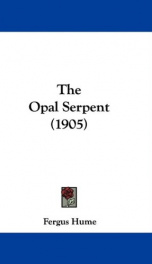
The Opal Serpent
Series:
Unknown
Year:
Unknown
Raiting:
4/5
Fergusson Wright Hume, known as Fergus Hume (1859- 1932) was an English novelist. Shortly after graduation he left for Melbourne. He began writing plays, but found it impossible to persuade the managers of the Melbourne theatres to accept or even read them. Finding that the novels of Emile Gaboriau were then very popular in Melbourne, he obtained and read a set of them and determined to write a novel of a similar kind. The result was the self-published novel The Mystery of a Hansom Cab (1886), which became a great success. After the success of his first novel and the publication of another he returned to England in 1888. He resided in the Essex countryside for thirty years, eventually producing over 100 novels and short stories. He was a capable writer of mystery stories, and may be looked upon as one of the precursors of the many writers of detective stories whose work was so popular in the twentieth century. His other works include Madame Midas (1888), The Silent House (1899), The Bishop's Secret (1900), Secret Passage (1905), The Green Mummy (1908), and Red Money (1912). --This text refers to an alternate Paperback edition.
Show more
add to favoritesadd In favorites
What readers are saying
What do you think? Write your own comment on this author!
write a commentGenre
- Books
- Literature & Fiction / Literary
- Books / Detective and mystery stories
- Literature & Fiction / Poetry
- Literature & Fiction / Classics
- Religion & Spirituality / Christianity
- Science / Mathematics
- Religion & Spirituality / Christianity / Reference
- Literature & Fiction / Genre Fiction / Historical
- Reference / Atlases & Maps / World
if you like Hume Fergus try:
readers also enjoyed
What readers are saying
What do you think? Write your own comment on this author!
write a commentGenre
- Books
- Literature & Fiction / Literary
- Books / Detective and mystery stories
- Literature & Fiction / Poetry
- Literature & Fiction / Classics
- Religion & Spirituality / Christianity
- Science / Mathematics
- Religion & Spirituality / Christianity / Reference
- Literature & Fiction / Genre Fiction / Historical
- Reference / Atlases & Maps / World
if you like Hume Fergus try:
readers also enjoyed
Do you want to read a book that interests you? It’s EASY!
Create an account and send a request for reading to other users on the Webpage of the book!
